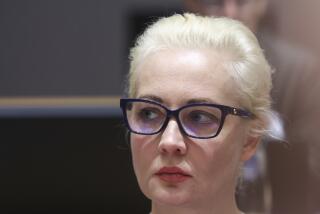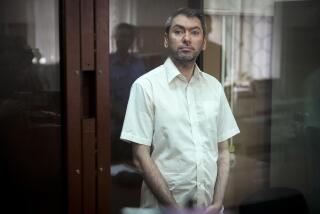Yelena Bonner dies at 88; wife of Andrei Sakharov was a Soviet human rights activist
- Share via
Reporting from Moscow -- Yelena Bonner, human rights activist and widow of Soviet dissident and Nobel Peace Prize winner Andrei Sakharov, has died. She was 88.
Bonner died Saturday afternoon in Boston after a long illness, said her daughter, Tatiana Yankelevich. Bonner had lived in the United States since 2003.
“Sakharov and Bonner together had done more for our country than a huge number of politicians,” Boris Nemtsov, leader of the Solidarity opposition movement and a former deputy prime minister of Russia, said Sunday. “The demise of such a Soviet dissident as Yelena Bonner is a huge loss for our society, which is badly disoriented by cynicism and cruelty and where humanism and dignity are no longer valued.”
Bonner was born Feb. 15, 1923, in the town of Merv in Soviet Central Asia to parents who later were victims of the Stalin regime. Her father, a Communist Party official, was detained in a 1937 purge and executed the next year. Her mother was sent to a prison camp for eight years.
At the age of 15, Bonner refused to denounce her parents as enemies of the people and was expelled from the Young Communist League. In World War II, she enlisted as a nurse and was sent to the front near Leningrad, where she was seriously injured in a bombing raid. After recovering in 1942, she returned to the front and served as a nurse until the war ended in 1945.
She later received a general practitioner’s degree at a Leningrad medical school and worked until the late 1960s, even joining the Communist Party in 1965, the same year she divorced her first husband.
In the late 1960s, she joined the dissident movement after the Soviet invasion of Czechoslovakia to crush the Prague Spring democratic movement.
In 1970, while attending a dissident’s trial in the Russian provincial city of Kaluga, she met Sakharov. The nuclear physicist, one of the fathers of the Soviet hydrogen bomb, had by that time been expelled from his role in the Soviet nuclear program because of his dissident activities.
Bonner discarded her Communist Party membership in 1972, the year they married. Until his death in 1989, the couple worked together to lead and inspire the growing human rights movement in the Soviet Union.
“Many in our country still think that Yelena … played the role of the evil genius for Sakharov, influencing him to become a staunch opposition leader,” Lev Ponomaryov, head of the For Human Rights movement, said in an interview. “But they really loved each other and respected each other’s views on life and politics, most of which they always shared.”
Bonner represented Sakharov when he was awarded the Nobel Peace Prize in 1975. Sakharov had been denied an exit visa so Bonner, who was getting medical assistance in Italy at the time, went to Oslo on his behalf and delivered his Nobel Prize speech.
She later joined him in Gorky, a provincial capital 250 miles east of Moscow, where he was exiled in 1980 without a trial after he lashed out at the Kremlin leadership for the Soviet invasion of Afghanistan.
Her son and daughter were expelled from universities for Bonner’s opposition activities in the 1970s and emigrated to the United States. When Sakharov’s daughter-in-law was not allowed to leave the country in 1981, Sakharov and Bonner went on a hunger strike until authorities gave in.
As a goodwill gesture in 1985, then-Soviet leader Mikhail Gorbachev allowed Bonner to travel to the United States to visit her children. In 1986, Gorbachev ended Sakharov’s exile in Gorky, and he and Bonner returned to Moscow where they were given a warm reception by opposition activists.
The couple then devoted themselves to help make Gorbachev’s perestroika policies irreversible.
Bonner continued her human rights activities after her husband’s 1989 death and after she moved to the U.S. in 2003, where she lived with her daughter in Boston. She continued corresponding with dozens of Russian activists and expressing her views on every important event back home, her daughter recalled.
“My mother took very closely and very personally everything happening in Russia, and she was bitterly disappointed with where Russia is heading,” Yankelevich said Sunday in a phone interview from Boston. “She was one of the first to insist that [Mikhail] Khodorkovsky [Russian jailed tycoon and opponent of Prime Minister Vladimir Putin] be called a prisoner of conscience and from the first day of Putin’s reign she was warning that Putin’s regime was purposely eradicating the budding democracy in Russia.”
In addition to her daughter, Bonner is survived by son Alexey Semyonov, five grandchildren and three great-grandchildren.
More to Read
Start your day right
Sign up for Essential California for the L.A. Times biggest news, features and recommendations in your inbox six days a week.
You may occasionally receive promotional content from the Los Angeles Times.




















































